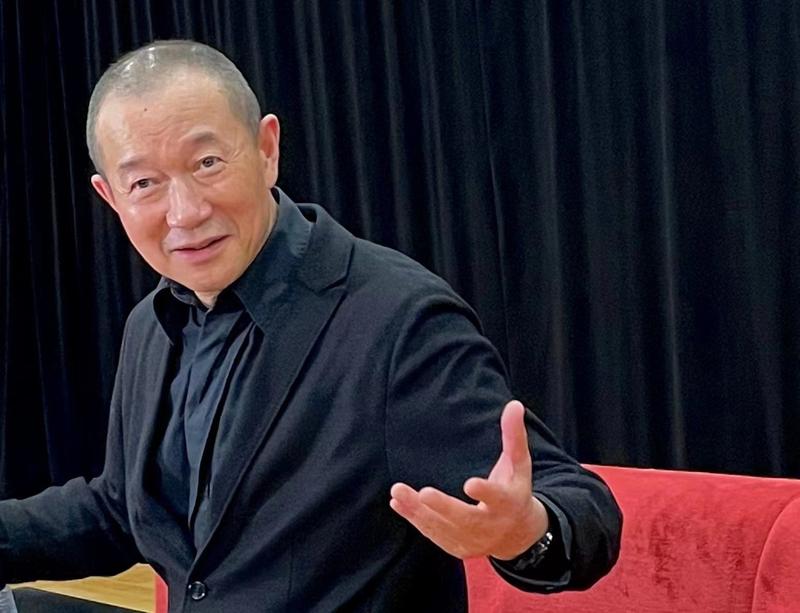 Tan Dun, an internationally renowned musician and maestro and a newly appointed Ambassador for Cultural Promotion, gives an interview to a group of journalists in Hong Kong on March 27, 2023. (WANG YUKE / CHINA DAILY)
Tan Dun, an internationally renowned musician and maestro and a newly appointed Ambassador for Cultural Promotion, gives an interview to a group of journalists in Hong Kong on March 27, 2023. (WANG YUKE / CHINA DAILY)
Hong Kong is the jewel in the crown of China, Asia and the world for promoting traditional Chinese cultural heritage far and wide, while assimilating other cultural influences to regenerate its own, said Tan Dun, an esteemed Chinese composer, musician and conductor.
“Hong Kong stands as a textbook example of elevating Chinese traditional cultural profile and earning it global currency,” said Tan, who is putting on a new hat this year after his appointment as Ambassador for Cultural Promotion by the Hong Kong Special Administrative Region government.
It’s by no means a hyperbole to say that Hong Kong has done more than its fair share in conserving Chinese traditional heritage, and yet not in an ostentatious manner
“How fantastic it would have been if China had a dozen cities like Hong Kong, the epitome of ‘East meets West’! But, the fact that we only have one Hong Kong holds the city’s peerless sway and agency in promoting Chinese intangible cultural heritage,” he said.
READ MORE: Festival to promote traditional Chinese culture held in HK
It’s by no means a hyperbole to say that Hong Kong has done more than its fair share in conserving Chinese traditional heritage, and yet not in an ostentatious manner, but rather quietly and consistently, Tan said. “Look at how well those Chinese antiques and quaint furniture have been preserved and restored in Hong Kong! You’ll be blown by the epic job.”
In Tan’s view, it’s self-evident the SAR has placed a premium on conserving traditional Chinese culture. The city is running ahead of the “arts tech” curve, and few cities in the world can match Hong Kong’s pulsating vigor and infectious zeal.
“All these shining spots coming together inspire me to envisage what sparks Hong Kong could ignite with Dunhuang (the site of the Mogao Caves in Gansu province) or Xi’an (the home of the the terracotta warriors) , as well as with New York, Amsterdam, London and Paris,” Tan said.
 Tan Dun (right) receives a certificate of the appointment of ambassador for cultural promotion from Secretary for Culture, Sports and Tourism Kevin Yeung Yun-hung on Dec 8. (PHOTO / HKSAR GOVERNMENT)
Tan Dun (right) receives a certificate of the appointment of ambassador for cultural promotion from Secretary for Culture, Sports and Tourism Kevin Yeung Yun-hung on Dec 8. (PHOTO / HKSAR GOVERNMENT)
Hong Kong is a must stop for all but international art performances, exhibitions and study exchanges, as well as foreign investment, he added. “The avenue for exporting Chinese culture and importing the foreign equivalent is here coming in handy.”
“A celebrated culture with an enduring presence and influence bears two attributes -- wisdom and audacity. And Hong Kong has them under its belt,” he said. Immersed in the kaleidoscopic city, where the past meets the present, the East merges with the West, and futuristic surrealism is punctuated by strokes of nostalgia, Tan feels there’s an impulse and an itch to explore untapped artistic license and leeway.
“Tan Dun’s Sound Vision in Chi Lin Nunnery” -- an immersive opera staged in the courtyard of the nunnery in Kowloon that he created to mark the 25th anniversary of the HKSAR’s establishment -- was informed by the consummate preservation of the Chinese ancient Buddhist traditions.
“I was viscerally touched by the sight of perfectly conserved architecture fashioned in the style of the Tang Dynasty. The presence of historical relics is palpable to all senses. The soul-purging resonance and emotive echoing in me (that the nunnery afforded) urged me to give something back to it, through my music and the accompaniment of film, drama and dance in a meta-universe,” said Tan.
All these offer a boost for Tan’s faith in Hong Kong’s role as an envoy spreading the words of traditional Chinese cultural wisdom to the world.
READ MORE: Make Chinese stories attractive, comprehensible
“But I think Hong Kong has to go the extra mile in promoting more literary art,” Tan said, adding that it is integral and the most soul-touching tapestry of Chinese traditional culture. It’s a missing piece in the city’s cultural and art promotion efforts, Tan said, comparing it to the commitment by Paris to translate and reimagine classic literary works.
“We may want to do away with some ostentatious and formalistic cultural practices that are somewhat skin-deep with little meaty substances.” He reckons that such a practice may look visually captivating and extravagant but identify with viewers in vain. “This kind of practice is most likely to be a flash in the pan because it detaches from people and their hearts.”
“The history of art and culture is documented by a cohort of creative people, and whether it’ll leave an imprint or vanish as time lapses will be decided by the collective voice of humanity, by how it remains legible and relatable to the future generations,” Tan said.


